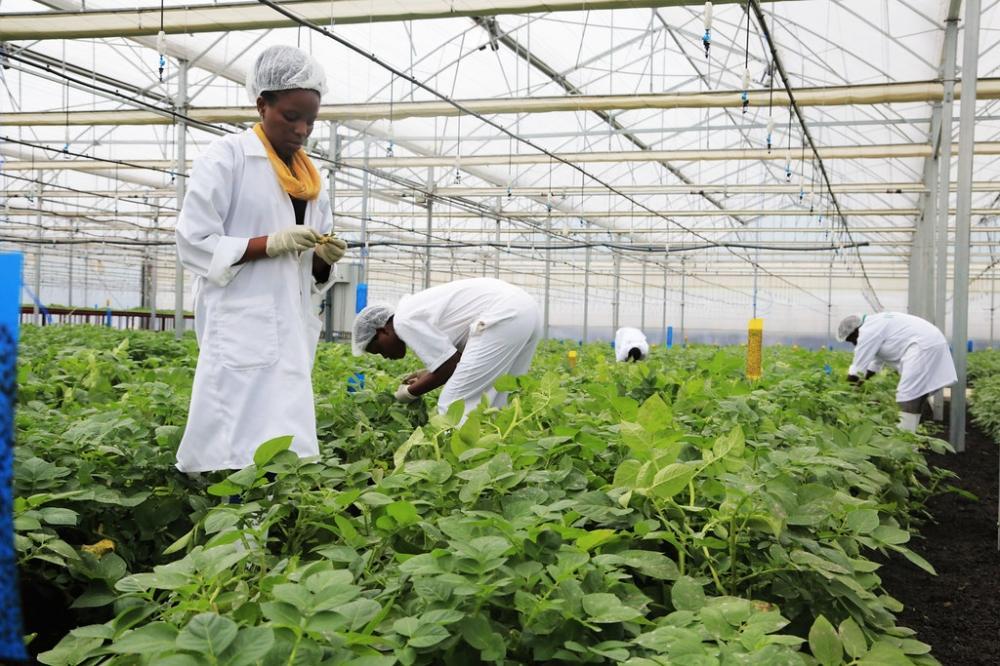Africa-Press – Rwanda. After more than three decades of cultivating the popular Kinigi Irish potato variety, Rwanda is set to introduce 11 new high-yielding and climate-resilient varieties to revitalize production and improve food security.
The move, spearheaded by the Ministry of Agriculture and supported by agricultural researchers, aims to provide farmers with improved seed options that can yield and withstand pests and diseases more than the variety named after the fertile Kinigi area in Musanze District, which is in the volcanic region.
In an interview with The New Times, Athanase Nduwumuremyi, a researcher and coordinator of the Roots and Tubers Programme at the Rwanda Agriculture and Animal Resource Development Board (RAB), said Kinigi is no longer performing optimally.
“Kinigi has been in use for over 30 years and is losing its vigour,” said Nduwumuremyi. “We now have 11 improved varieties under early multiplication and several others still under research. Developing new varieties is a lengthy process; breeding alone can take over 10 years before a seed is ready for farmers.”
The varieties include Gikungu, Cyerekezo, and Ndamira. Cyerekezoi is one of the most promising varieties in ongoing trials, delivering nearly double the yield of traditional varieties.
In controlled trials, 200 kg of Cyerekezo seed yielded over 1.5 tonnes of potatoes, the official said.
Irish potatoes remain one of Rwanda’s most important staples and income-generating crops, particularly in high-altitude regions with fertile volcanic soils in the northwestern part of the country.
Major production hotspots include Musanze, Burera, Nyabihu, Rutsiro, and parts of Rubavu, which collectively account for more than 80% of national output. Annual potato production grew from 2.2 million tonnes in 2013 to 6 million tonnes in 2019. However, yields per hectare remain relatively low due to continued reliance on recycled seeds vulnerable to diseases like late blight and bacterial wilt.
Members of Parliament recently voiced their support for the development of new seeds as one way to tackle the challenges affecting potato farming.
Alice Muzana, Chairperson of the Parliamentary Committee on Land, Agriculture, Livestock, and Environment, said on July 10 that the new varieties will complement Kinigi and offer better returns for smallholder farmers.
“These new varieties bring renewed hope for greater productivity and sustainability in potato farming,” Muzana stated.
Currently, Irish potato seeds cost between Rwf1,200-1,500 per kilogram, a cost many smallholder farmers struggle to afford. Muzana emphasized the need to train more certified seed multipliers to increase production and lower prices.
“High prices are driven by limited supply,” said the MP. “As demand for Irish potatoes continues to rise, strengthening local seed production systems is crucial, especially with varieties adapted to climate change.”
MP Aimée Marie Ange Tumukunde highlighted the importance of aligning new seed varieties with Rwanda’s diverse soil types to maximize their performance.
“Each seed must match the right soil type. Soil compatibility assessments should guide distribution strategies,” Tumukunde said.
To support this transition, RAB, researchers, and development partners have adopted a participatory research and development model.
This collaborative approach engages farmers and stakeholders early in the process to improve adoption and effectiveness of new seed varieties.
For More News And Analysis About Rwanda Follow Africa-Press






